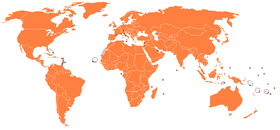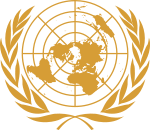- World Intellectual Property Organization
-

World Intellectual Property Organization
WIPO logoOrg type Specialized Agency Acronyms WIPO Head Director-General of WIPO Francis Gurry Status Active Established 1967 Website www.wipo.int  Francis Gurry in 2011
Francis Gurry in 2011
The World Intellectual Property Organization (WIPO) is one of the 16 specialized agencies of the United Nations. WIPO was created in 1967 "to encourage creative activity, to promote the protection of intellectual property throughout the world".[1]
WIPO currently has 184 member states,[2] administers 24 international treaties,[3] and is headquartered in Geneva, Switzerland. The current Director-General of WIPO is Francis Gurry, who took office on October 1, 2008.[4] 183 of the UN Members as well as the Holy See are Members of WIPO. Non-members are the states of Cook Islands, Kiribati, Marshall Islands, Federated States of Micronesia, Nauru, Niue, Palau, Solomon Islands, Timor-Leste, Tuvalu, Vanuatu and the states with limited recognition. Palestine has observer status.[5]
Contents
History
The predecessor to WIPO was the BIRPI (Bureaux Internationaux Réunis pour la Protection de la Propriété Intellectuelle, French acronym for United International Bureaux for the Protection of Intellectual Property), which had been established in 1893 to administer the Berne Convention for the Protection of Literary and Artistic Works and the Paris Convention for the Protection of Industrial Property.
WIPO was formally created by the Convention Establishing the World Intellectual Property Organization, which entered into force on April 26, 1970. Under Article 3 of this Convention, WIPO seeks to "promote the protection of intellectual property throughout the world." WIPO became a specialized agency of the UN in 1974. The Agreement between the United Nations and the World Intellectual Property Organization[6] notes in Article 1 that WIPO is responsible
- "for promoting creative intellectual activity and for facilitating the transfer of technology related to industrial property to the developing countries in order to accelerate economic, social and cultural development, subject to the competence and responsibilities of the United Nations and its organs, particularly the United Nations Conference on Trade and Development, the United Nations Development Programme and the United Nations Industrial Development Organization, as well as of the United Nations Educational, Scientific and Cultural Organization and of other agencies within the United Nations system."
The Agreement marked a transition for WIPO from the mandate it inherited in 1967 from BIRPI, to promote the protection of intellectual property, to one that involved the more complex task of promoting technology transfer and economic development.[7]
Unlike other branches of the United Nations, WIPO has significant financial resources independent of the contributions from its Member States. In 2006, over 90% of its income of just over CHF 250 million[8] was expected to be generated from the collection of fees by the International Bureau (IB) under the intellectual property application and registration systems which it administers (the Patent Cooperation Treaty, the Madrid system for trade marks and the Hague system for industrial designs).
Criticism
As with all United Nations multi-government forums, WIPO is not an elected body. WIPO usually attempts to reach decisions by consensus, but in any vote, each Member State is entitled to one vote, regardless of population or contribution to the funding. This factor has led to significant consequences over certain issues,[vague] due to the North-South divide in the politics of intellectual property. During the 1960s and 1970s, developing nations were able to block expansions to intellectual property treaties, such as universal pharmaceutical patents which might have occurred through WIPO.[vague]
In the 1980s, this led to the United States and other developed countries "forum shifting" intellectual property standard-setting out of WIPO and into the General Agreement on Tariffs and Trade, which later evolved into the World Trade Organization, where the North had greater control of the agenda. This strategy eventually resulted in the enactment of Agreement on Trade-Related Aspects of Intellectual Property Rights (TRIPS).[citation needed]
Much of the important work at WIPO is done through committees, including the Standing Committee on Patents (SCP), the Standing Committee on Copyright and Related Rights (SCCR), the Advisory Committee on Enforcement (ACE), and the Intergovernmental Committee (IGC) on Access to Genetic Resources, Traditional Knowledge and Folklore, and the Working Group on Reform of the Patent Cooperation Treaty.[who?]
In October 2004, WIPO agreed to adopt a proposal offered by Argentina and Brazil, the "Proposal for the Establishment of a Development Agenda for WIPO" - from the Geneva Declaration on the Future of the World Intellectual Property Organization.[9] This proposal was well supported by developing countries. A number of civil society bodies have been working on a draft Access to Knowledge (A2K)[10] Treaty which they would like to see introduced.
The Washington Post reported in 2003 that Lois Boland (USPTO Director of International Relations) said "that open-source software runs counter to the mission of WIPO, which is to promote intellectual-property rights." Also saying, "To hold a meeting which has as its purpose to disclaim or waive such rights seems to us to be contrary to the goals of WIPO."[11]
Information network
WIPO has established WIPOnet, a global information network. The project seeks to link over 300 intellectual property offices (IP offices) in all WIPO Member States. In addition to providing a means of secure communication among all connected parties, WIPOnet is the foundation for WIPO's intellectual property services.[12]
See also
- Anti-Counterfeiting Trade Agreement
- Geneva Declaration on the Future of the World Intellectual Property Organization
- Intellectual property
- Substantive Patent Law Treaty (SPLT)
- Treaties administered by the World Intellectual Property Organization
- Uniform Domain-Name Dispute-Resolution Policy
- World Intellectual Property Day (April 26)
- World Intellectual Wealth Organisation
Notes and references
- ^ Convention Establishing the World Intellectual Property Organization, [1] signed at Stockholm on July 14, 1967, Preamble, second paragraph.
- ^ List of members states of WIPO. Consulted on September 11, 2008.
- ^ Treates administered by WIPO. Consulted on September 11, 2008.
- ^ WIPO web site, Francis Gurry is appointed Director General of WIPO, News Archive 2008. Consulted on September 27, 2008.
- ^ Palestine WIPO status
- ^ Agreement between the United Nations and the World Intellectual Property Organization
- ^ p12, Shabalala et al. "A Citizen's Guide to WIPO" CIEL 2007. Available at: http://www.ciel.org/Publications/CitizensGuide_WIPO_Oct07.pdf
- ^ Proposed program and budget 2006/2007 estimates 456m fee income out of total 531m income for the biennium, WO/PBC/8/3
- ^ Consumer Project on Technology web site, Geneva Declaration on the Future of the World Intellectual Property Organization
- ^ Consumer Project on Technology web site, Access to Knowledge (A2K)
- ^ Jonathan Krim, The Quiet War Over Open-Source, The Washington Post, August 21, 2003
- ^ United Nations Multilingual Terminology Database, Entry on World Intellectual Property Organization. Consulted on February 24, 2008.
External links
Categories:- International trade
- Patent offices
- World Intellectual Property Organization
- United Nations specialized agencies
Wikimedia Foundation. 2010.


